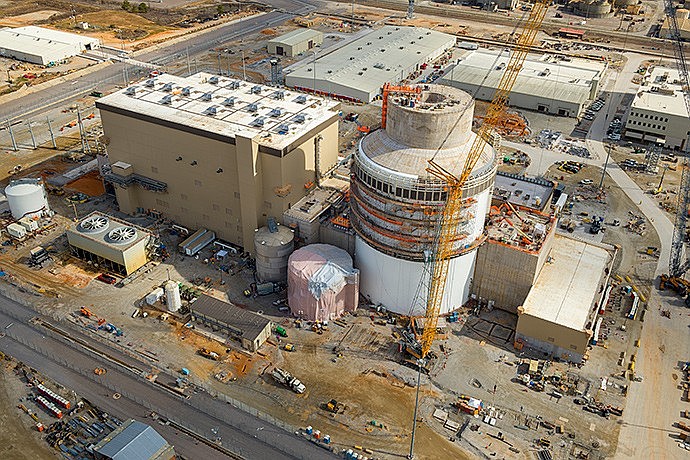Georgia Power's nuclear expansion of Plant Vogtle is even further behind than the company recently acknowledged and has faced an unexpected array of quality issues, according to testimony from independent state monitors and staff of Georgia regulators.
The first of two new reactors likely won't be in operation until at least the summer of 2022, and the project's total costs are likely to rise at least another $2 billion, according to one key monitor's report Monday.
A crucial round of testing underway has been "an unexpectedly poor showing" and "significantly more problematic" than anticipated, wrote another monitor and a staff member for the Georgia Public Service Commission.
Located south of Augusta, the massive Vogtle expansion is the only major new commercial nuclear project in the country. It's already years behind schedule and billions of dollars over budget. Georgia residents, businesses, schools and others might be forced to pick up the growing tab through monthly electric bills.
"Many of the problems encountered by SNC should have been resolved long before" the current testing, PSC staffer Steven Roetger and monitor William Jacobs wrote. Monitor Donald Grace added that the reactor "is in a worse condition than past U.S. new construction nuclear plants were at this same stage of construction/testing."
SNC, or Southern Nuclear, is part of Atlanta-based Southern Company, as is Georgia Power.
Despite numerous redactions demanded by Georgia Power as trade secrets, the written testimony filed with the PSC still describes a host of recent quality control, workmanship and component problems. Until recently, the company said it would have its first new reactor supplying electricity to Georgia homes and businesses no later than this November.
The second new reactor is slated to be fully running no later than November of 2022. But in the latest testimony, Grace said the second reactor is unlikely to be in commercial operation until at least June of 2023.
Plant Vogtle at a glance
› Location: Burke County, Georgia› Owners: Georgia Power (45.7 percent), Oglethorpe Power Corp., (30 percent), Municipal Electric Association of Georgia or MEAG (22.7 percent) and Dalton Utilities (1.6 percent)› Operating units: Two reactors competed in 1987 and 1989› New units being built: Westinghouse AP1000 reactors scheduled to be finished by 2022, but one of the units may not be in commercial operation until 2023.
Last month, company officials warned regulators that an ongoing array of testing on the first of two new reactors uncovered problems and, as a result, the project wouldn't be completed until the first three months of next year.
On Tuesday, Georgia Power spokesman John Kraft said the company stands by that timing, while suggesting there was a chance it could be done even sooner. He said the company still aims to finish the second reactor by November of 2022.
"Additional construction remediation work" was needed prior to the current testing, Kraft wrote. And "as anyone would expect during significant testing activity, the site has worked through numerous start-up and operational-type issues including refinements to control system logic and plant chemistry. The types of issues we are addressing during testing are not unexpected and are more related to operating systems together with temperature for the first time."
As for the chance of costs rising another $2 billion, Kraft wrote that the company has presented cost estimates "using its best judgment" while "continually emphasizing that risks remain on the project and it is possible that the cost estimate could increase in the future."
Most electric cooperatives and city utilities in Georgia are financially tied to the project, which aims to provide more carbon-free energy for decades.
"It's déjà vu all over again," said Kurt Ebersbach, a senior attorney at the Southern Environmental Law Center, which represents some organizations opposed to customers paying for Vogtle's overruns.
While the monitors and staff typically offer a competing view to the company's, "staff has consistently been proved right over the years," he said.
"The most expensive construction project in Georgia history keeps getting more absurdly costly, and the only people benefiting from that sorry state of affairs are Company shareholders," Ebersbach said.
The first new reactor was originally slated to be in operation in the spring of 2016, followed by a second new reactor a year later. But the project has faced numerous problems, sending costs soaring above what the company originally told regulators to expect.
Though the new Vogtle units have yet to produce any electricity, Georgia Power customers' bills have for years included financing costs and profits on the project for the state's largest electric monopoly, an allowance approved by the state legislature.
By the time the construction work is completed, the average Georgia Power residential customer will have paid $854 toward Vogtle's expansion, according to a PSC staff and monitor report filed this week. Then customers are expected to pay more as construction costs are rolled into their bills.
